Key takeaways:
- Anxiety can significantly impact daily life, affecting perceptions, relationships, and overall well-being.
- Common triggers include new social situations, unpredictability in life events, and pressure associated with specific tasks.
- Effective coping strategies involve mindfulness techniques, establishing routines, and engaging in physical activities.
- Support systems, whether personal or professional, are crucial in managing anxiety and providing validation through shared experiences.
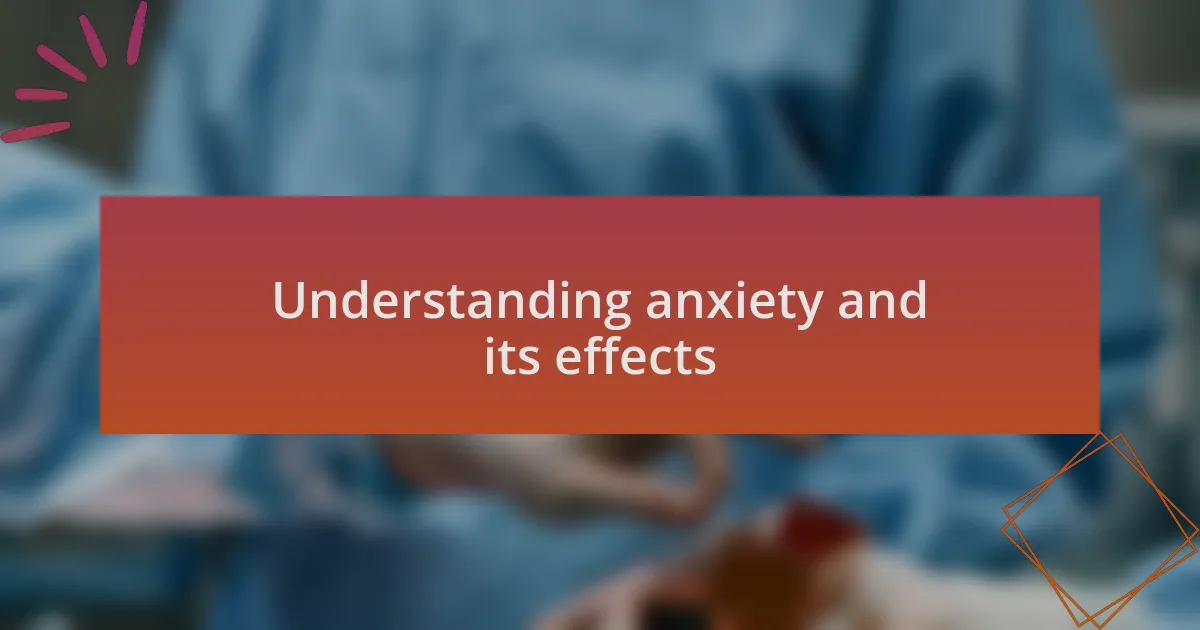
Understanding anxiety and its effects
Anxiety is a complex emotional response that can manifest in both psychological and physical ways. I remember a time when my heart raced before a presentation, leaving me feeling detached and overwhelmed. This experience made me acutely aware of how anxiety can distort our perceptions, making even simple tasks seem daunting.
The impact of anxiety extends beyond mere worry; it can affect our relationships, work efficiency, and overall well-being. Have you ever felt that tightness in your chest when faced with a stressful situation? It’s as if the body braces itself for a fight or flight response, making it challenging to think clearly. I’ve found that recognizing these physical reactions can provide an opportunity for intervention.
Moreover, understanding anxiety as a common human experience can be surprisingly liberating. I often remind myself that many individuals face similar battles, which fosters a sense of connection and solidarity. How do you cope with your own feelings of anxiety? Exploring this question can lead to valuable insights into not only personal strategies but also shared communal experiences.
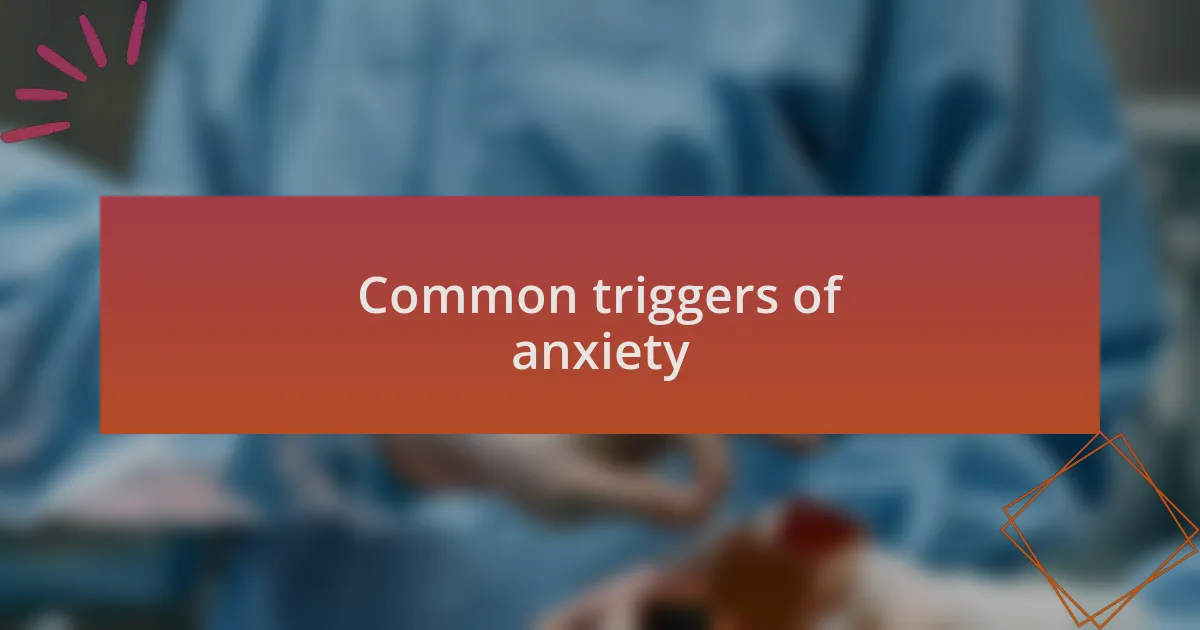
Common triggers of anxiety
When I reflect on my own experiences, certain situations consistently bubble to the surface as common anxiety triggers. For instance, meeting new people or entering unfamiliar environments often sends my mind into overdrive. Have you ever felt the pressure to make a lasting impression while battling that inner voice of self-doubt? It’s a feeling I know too well—one that can turn a simple social event into a minefield of apprehension.
Additionally, the unpredictability of life events can amplify anxiety. I recall a time when an unexpected change at work left me questioning my stability and future. The fear of the unknown can create a relentless loop of worry. How many of us have stayed up late, caught in a whirlwind of what-ifs? Those late-night thoughts can feel overwhelming, reminding us that anxiety often feeds on uncertainty.
Moreover, even seemingly mundane tasks can become anxiety-inducing under pressure. For me, the thought of public speaking always triggers a wave of nervous energy. When I consider the possibility of forgetting my lines or stumbling over my words, it heightens my unease. What about you? Have you found moments of stress creeping into tasks you once found easy? Understanding these triggers helps in navigating our anxiety more effectively, opening up a pathway to develop coping strategies tailored to our unique experiences.
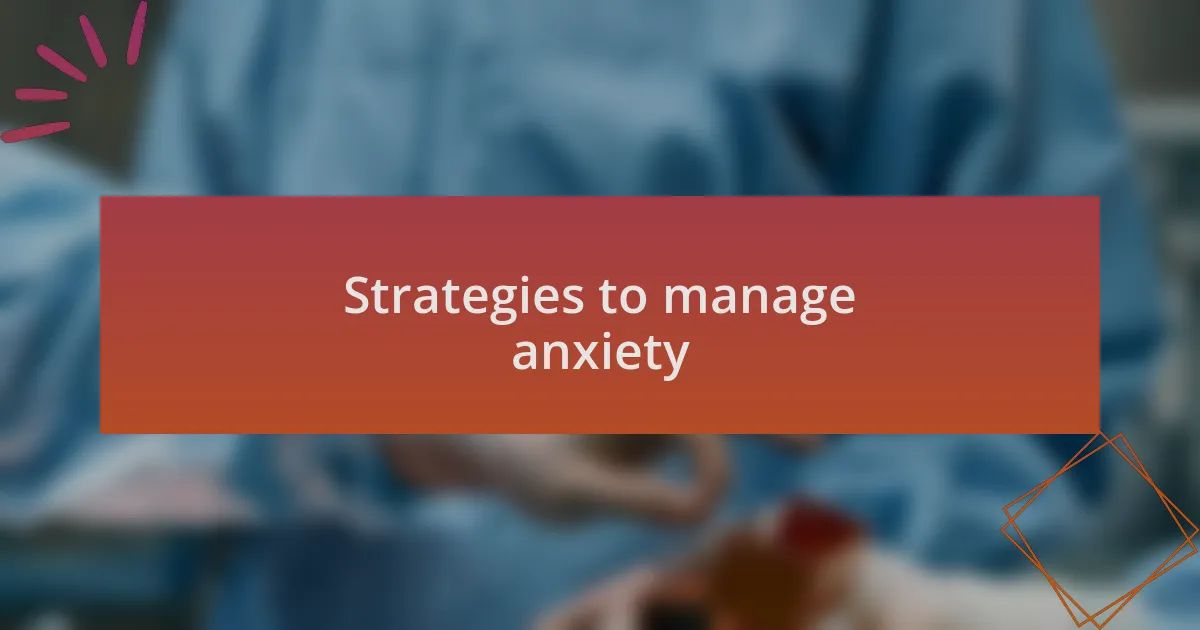
Strategies to manage anxiety
When it comes to managing anxiety, I have found that incorporating mindfulness techniques can be powerful. One evening, I dedicated a few minutes to focused breathing exercises, allowing myself to escape the chaos of racing thoughts. I discovered that just acknowledging my anxiety without judgment helped me regain some control over my feelings. Have you ever tried simply being present in the moment, rather than spiraling into “what if” scenarios?
Another strategy that has worked for me is establishing a routine. There was a time in my life when unpredictability felt overwhelming, so I began structuring my days with consistent activities. This structure not only created a sense of stability but also gave me a reliable framework to manage anxiety. How often do you find comfort in knowing what to expect throughout your day?
Physical activity has also played a crucial role in my anxiety management. I vividly remember a period when I started jogging regularly; each run became a form of therapy. Those moments outdoors allowed me to release pent-up energy while basking in nature’s beauty. Can you recall a time when moving your body helped clear your mind? Taking small steps toward embracing these strategies can significantly improve one’s well-being and resilience against anxiety.
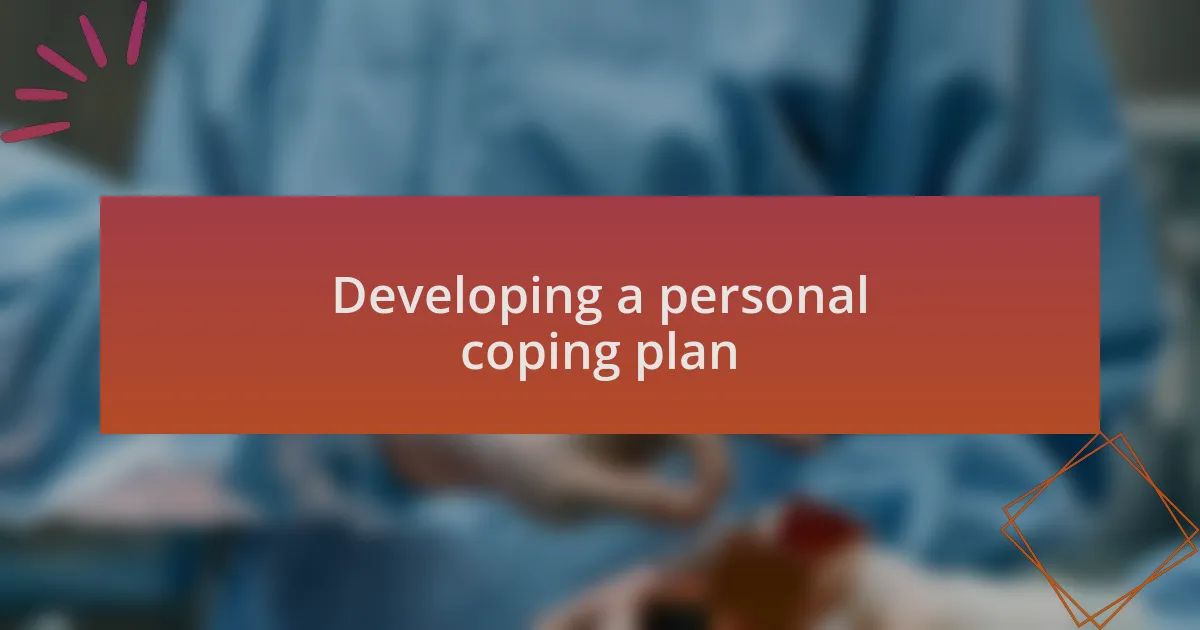
Developing a personal coping plan
Creating a personal coping plan requires a thoughtful blend of strategies tailored to your unique needs. When I faced anxiety during challenging surgical rotations, I started mapping out specific actions that I could take in moments of overwhelm. For instance, jotting down my thoughts in a journal allowed me to process feelings and clarify what triggered my anxiety. Have you ever found it helpful to externalize worries rather than keep them bottled up?
I also realized that the coping strategies I developed had to be easily accessible during high-pressure situations. One time, while preparing for a critical presentation, I created a quick checklist of grounding techniques. It included sipping water, taking deep breaths, and even stepping outside for a moment of fresh air. Have you thought about what tools you might carry with you to help in the heat of the moment?
Lastly, revisiting and adjusting my plan was essential. As I learned more about myself through my experiences, I noticed that certain strategies didn’t work as effectively as I hoped. For example, while meditation helped some nights, other evenings I needed a more active approach, like calling a friend. Have you considered how fluid your coping plan might need to be to truly serve you? Adapting strategies over time can lead to deeper self-awareness and improved support in managing anxiety.
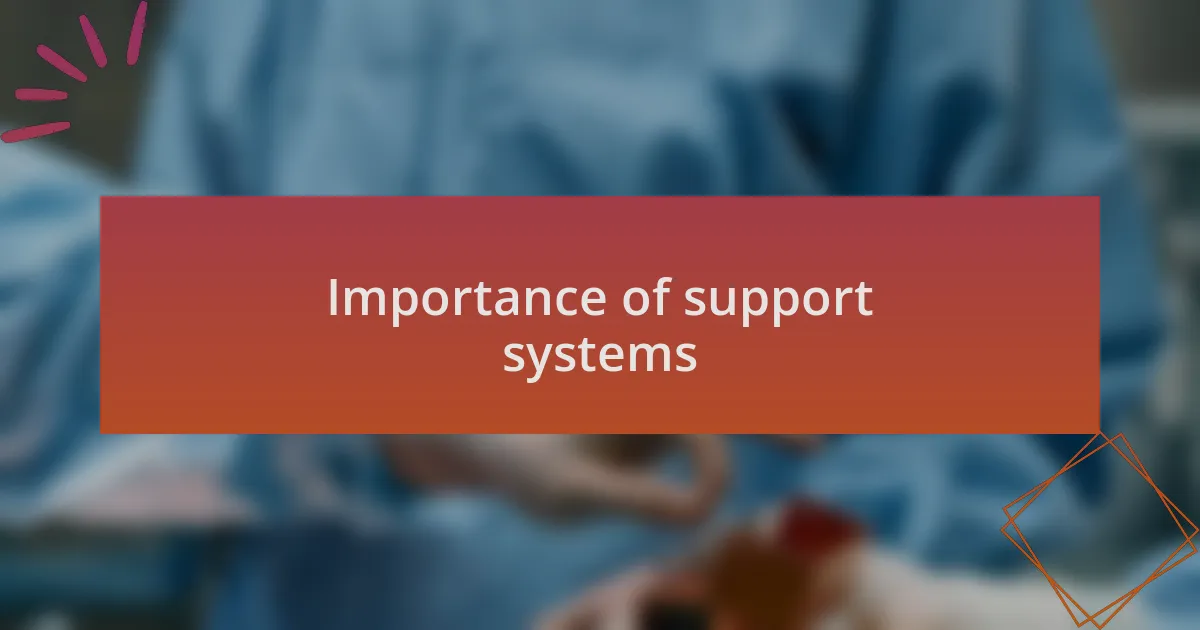
Importance of support systems
Support systems play a crucial role in managing anxiety, especially in high-stress environments like surgical settings. I can vividly recall a particularly trying day when a colleague noticed I was tense and overwhelmed. Without hesitation, she sat down next to me and shared her own experiences with anxiety. That simple act of connection showed me how powerful it can be to lean on someone who understands what you’re going through. Have you ever experienced a moment where just talking to someone made a world of difference?
In addition to friends or family, professional support is invaluable. I once attended a workshop led by a clinical psychologist who specialized in anxiety management for healthcare professionals. The insights I gained from that session were eye-opening. I learned about the importance of boundaries and self-compassion, reminding me that I wasn’t alone in my feelings. Have you thought about how seeking professional guidance could be a game-changer for your own anxiety journey?
Moreover, having a diverse support network can further enhance coping strategies. While my immediate friends provided emotional support, I found that engaging with a local support group added another layer of understanding to my experience. Sharing stories with individuals facing similar challenges created a safe space where I felt validated. It’s fascinating how sometimes just knowing that others are navigating the same waters can provide a sense of relief. How do you think expanding your support circle might impact your own anxiety management?
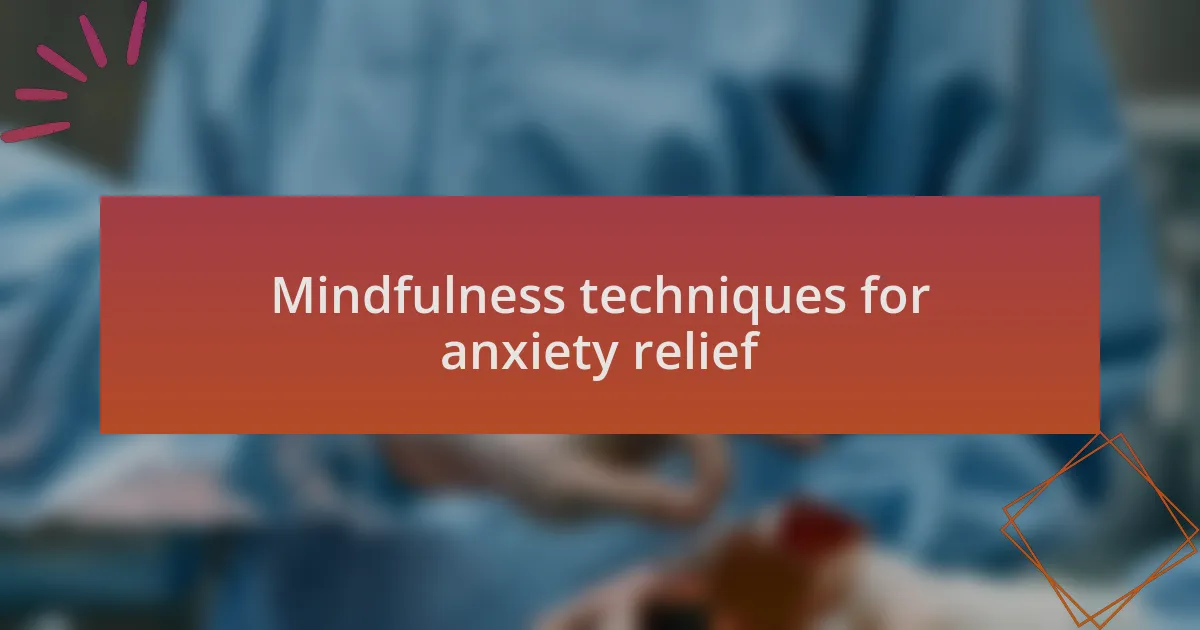
Mindfulness techniques for anxiety relief
Mindfulness techniques can serve as effective tools for managing anxiety. During my shifts, I often find myself overwhelmed with thoughts and pressures, leading to heightened stress. I discovered a simple technique: taking a few moments to focus on my breath. Inhale deeply, hold for a count of four, and then exhale slowly. This practice, known as deep breathing, helps ground me and creates a brief, peaceful oasis amidst the chaos. Have you tried focusing on your breath during stressful moments?
Another technique that has proven invaluable is body scanning. I remember a particularly hectic day where I felt tension creeping into my shoulders and neck. By sitting quietly and mentally scanning my body from head to toe, I was able to recognize where I was holding stress. Releasing that tension through conscious relaxation transformed my mindset and improved my focus. Have you explored how tuning into your body can shift your emotional state?
Lastly, I’ve found journaling to be an enlightening mindfulness practice. Writing down my anxious thoughts, especially after a challenging day, acts as a confession of sorts. It’s as if I unburden myself onto the page, creating space for clarity and insight. This simple act of reflection has taught me that what feels overwhelming often loses its power when articulated. How might sharing your inner dialogue on paper help you navigate your anxiety?
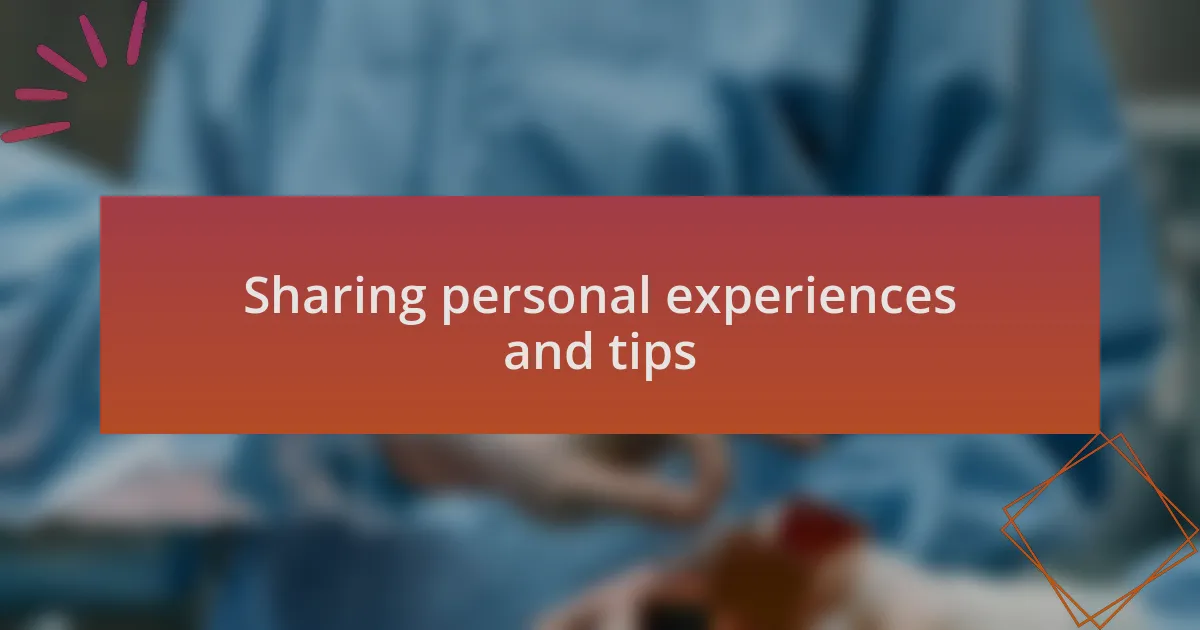
Sharing personal experiences and tips
One of my go-to strategies for coping with anxiety is the practice of reaching out to friends or colleagues. I remember a time when I was feeling particularly overwhelmed by a surgical case. Instead of keeping it to myself, I called a trusted friend who could relate. Just sharing my thoughts and fears lifted a huge weight off my shoulders. Have you considered how vocalizing your struggles can make them feel more manageable?
I find that creating a structured routine becomes invaluable during anxious times. There was a period when I had multiple surgeries and felt like I was on autopilot, spiraling into worry. By establishing a daily schedule that included time for relaxation and hobbies, I regained a sense of control. It made me realize how important it is to carve out moments that are just for me. How would a structured routine impact your days?
Another method I’ve appreciated is engaging in physical activities. I recall feeling anxious before a presentation, so I decided to go for a brisk walk. Not only did the fresh air help clear my head, but moving my body also released those built-up anxieties. I returned feeling more centered and ready to tackle the task. Have you explored how movement can serve as a release for tension and anxiety?